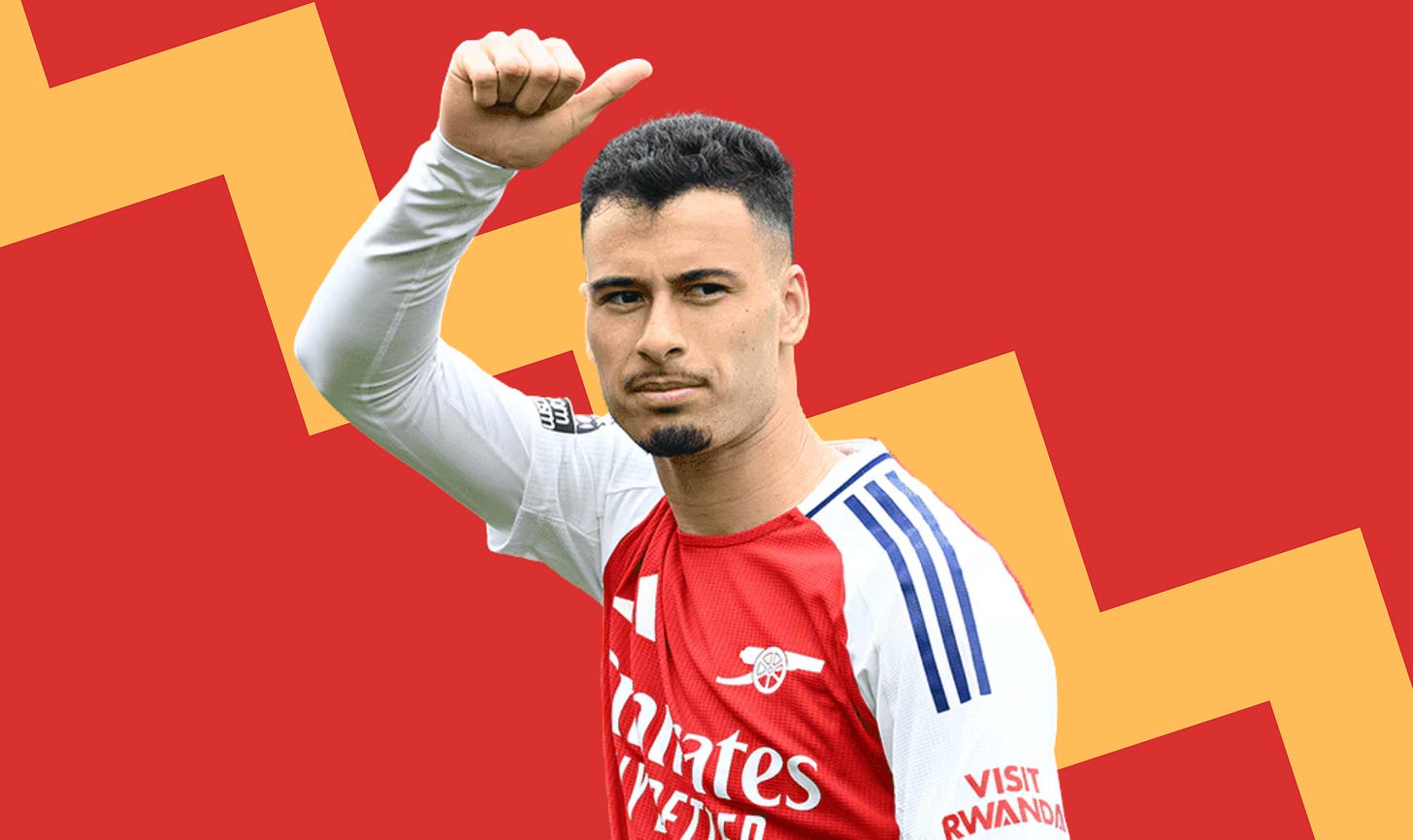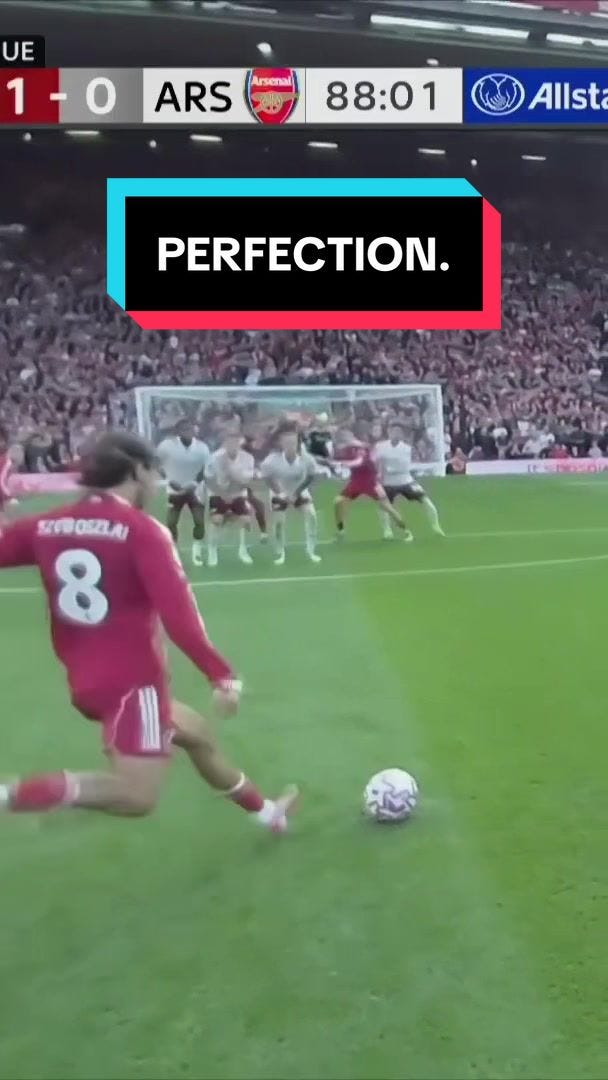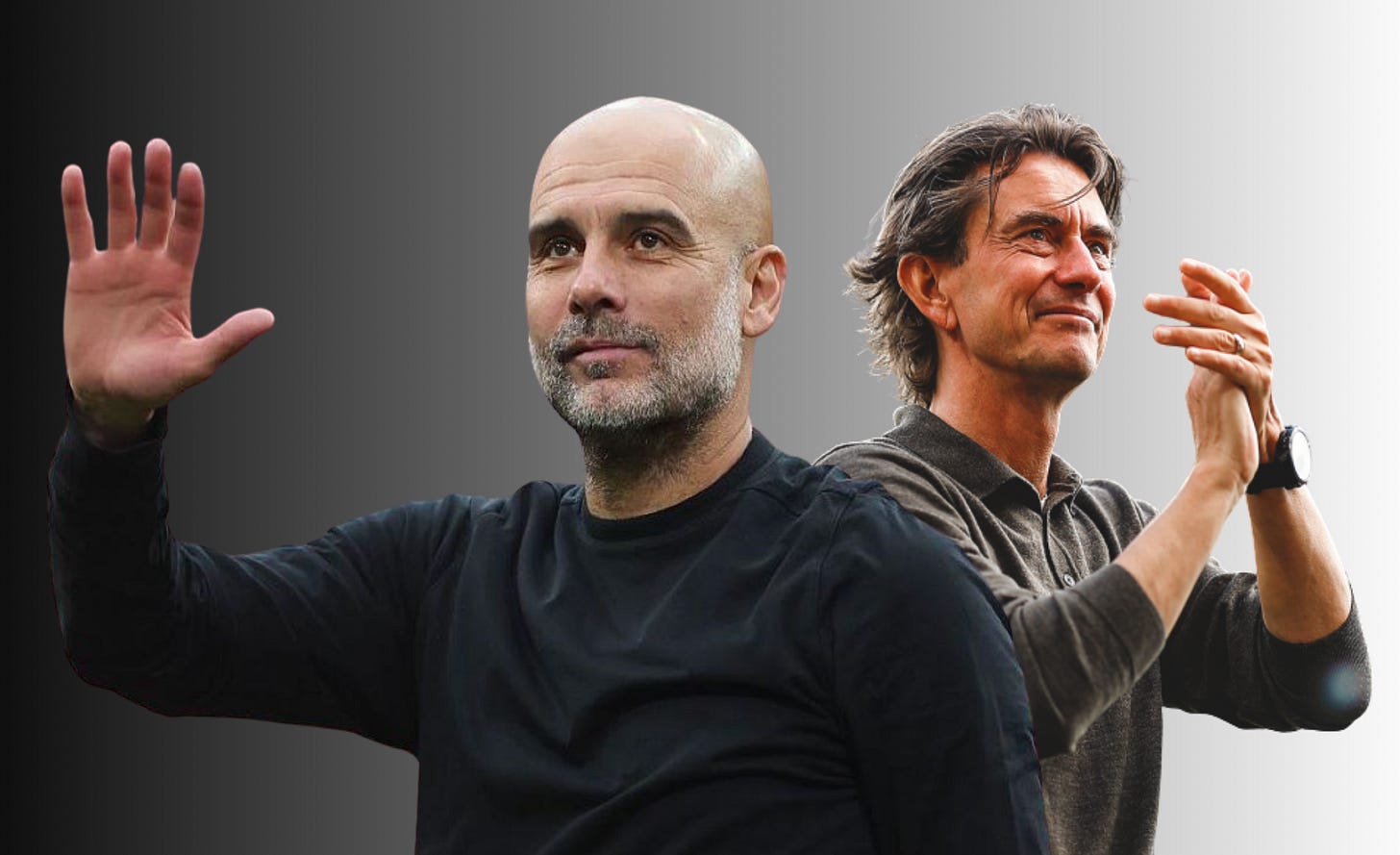Gabriel Martinelli Is Arsenal's Problem in a Nutshell
Liverpool had everything the Gunners did not at Anfield on Sunday.
It’s a results business, and for Liverpool, business is good. Their helter-skelter victories over the first two matchweeks were not the stuff of champions, particularly when multi-goal leads were squandered, but their 1-0 triumph over potential title rivals Arsenal at Anfield on Sunday was the right stuff. They had control of the game for just 25 minutes or so in the second half, but that was enough to snatch the result with a certified wondergoal from Dominik Szoboszlai.
The makeshift right back’s strike from 34 yards dipped viciously, arrowed in with real lethality, just a bit reminiscent of Declan Rice’s telling second free kick for Arsenal against Real Madrid in the Champions League last season. David Raya cheated towards the post that Szoboszlai ultimately hit, but as Lee Dixon put it on the NBC commentary, the Arsenal goalkeeper “could’ve moved last Tuesday and he still wouldn’t have got it.”
Szoboszlai made a telling contribution on the other side of the ball, too. He kept Gabriel Martinelli well in-check in that makeshift fullback role, though the Brazilian forward didn’t do too much to trouble him in the first place. Indeed, Martinelli didn’t try too much, and that’s far too often the case. It feels like a lifetime ago that Arsenal’s #11 was scoring key goals against Chelsea and the like, but now he rarely even takes on his fullback. When he does attack someone on the dribble, he rarely beats them. And when he gets into the box with a chance to shoot or find a teammate, he rarely does either one. His low crossing is particularly wasteful.
But it’s that first point, where he gives the defender so little to think about, that could be most damning for Martinelli. Nobody on either side had a vintage game, but at least Noni Madueke continually asked questions of Miloš Kerkez down the other flank. The Hungarian fullback answered most of them, even if Madueke got in behind him a couple of times, but the young Englishman tried things. When Eberechi Eze made his debut for Arsenal, coming on for Martinelli down the left, the difference was immediate. He was popping the ball by the Red shirts, twisting and turning. Nothing quite came off, but there was a spark there, a worry for the home side.
There was always a good argument for starting Martinelli, and it’s obvious why Mikel Arteta loves him: he runs the yards, he defends well, he supports the overall structure of a very structured Arsenal side. But he’s missing everything that Arsenal fans have been crying out for, particularly from their wide left forward: unpredictability, bravery with the ball at his feet, and execution in and around the opposition box. Arsenal were very secure at the back in the first half apart from some self-inflicted wounds playing out from deep, and they had good control in midfield. But they just didn’t have enough in the final third, an all-too-familiar story for a year now.
 Tiktok failed to load.
Tiktok failed to load.Enable 3rd party cookies or use another browser
On the flip side, Mo Salah symbolized what Liverpool were about: The Egyptian legend took the first hour or so off, as he often seems to do these days, but when he woke up, he immediately produced threat. He is a results player in a results team. End product, goals and assists, and even before that: just a bit of magic, a dart in behind or a haunting series of tiny touches and stepovers to twist Riccardo Calafiori inside and out. It only happened a couple of times, but it threw Arsenal’s whole shape out of balance. That period in the middle of the second half was all that Salah and Liverpool needed — well, that and the wonderstrike from the parking lot.
The byword for this version of Arteta’s Arsenal has been “control” for a couple of years now. Control in midfield, control over the game state, control at the back (where they really are solid). But are you really in control of a game when you don’t have the goals to show for it?
This team is radically different from those later Arsène Wenger sides who played beautiful stuff without the stiff spine necessary to win things, but the fundamental truth they both suffer with is largely the same: You can’t go to Anfield, control the match for most of the first hour, and not have a goal or two to show for it. Not if you want to win the match, which Arsenal have not done at this ground since 2012 — when Arteta was playing in Wenger’s midfield.
There are plenty of storylines coming out of this one, not least the fact that the key signing in each of these engine rooms — Martín Zubimendi for Arsenal, Florian Wirtz for Liverpool — is taking some time to get up to the pace of this league. Zubimendi probably had more of an impact here out of the two (apart from a sharp strike from Wirtz in the second half), but he’s been overrun at times during his first few matches in English football. Liverpool’s magnetic German, on the other hand, has really struggled to make an impact.
And yet it didn’t matter. Anfield was quiet for large spells of the first half, but it exploded in song and noise on 64 minutes as the Reds went marching on — just long enough to get the goal and the result. The old reliables came good at key junctures, while Arsenal’s old reliables, Martinelli chief among them, simply did not. The away side were missing their best player in Bukayo Saka, their key creator is not fully fit in Martin Ødegaard, and one of their key deep passers, William Saliba, went off injured here after just five minutes. But they’ve now got arguably the strongest squad in the league, no component of which was prepared to make the kind of telling contribution that Liverpool’s defending champions were. Perhaps they are doing champion things after all.
False Starts and False Dawns
Both Tottenham and Manchester City heralded new eras over the first few weeks of this season, the former with their new manager and 450% less chaos in how they approach a game of football, the latter with a whole fleet of new signings with whom Pep Guardiola surely would return to form as a genuine threat to win the Premier League.
The Spurs honeymoon with Thomas Frank is surely over, though, after the 1-0 battering they took from Bournemouth on their home patch. They were fortunate to go into halftime down by just a goal, and the desperation with which the home crowd bayed for a second yellow card for Bournemouth’s Antoine Semenyo shortly after the break betrayed Tottenham’s desperation to change the game state. They didn’t get that decision, nor did they ever get much of a sustained foothold in the game.
It was all a reminder of how steep the climb is from losing 22 league matches in a season, as Spurs did in their last campaign, though it’s worth bearing in mind that Bournemouth are a really, really good side. So good, you have to wonder whether Andoni Iraola could have gotten the Spurs job at Frank’s expense. There was only one winner of the tactical battle here, as the Cherries pressed high with huge intensity and running power, clobbering the men in white and stampeding onto the Spurs backline when they won possession.
As for City, my prediction for how Erling Haaland would start this season is in only moderate trouble, but the frailty and fragility that became a new and ugly trademark for Guardiola’s side last season does not seem to have faded in the summer sun. The Sky Blues will certainly be in amongst the Top Four discussion, maybe even on the outside of the title race, but the way Brighton were able to flip this match on its head and steal the points off them is a major concern. I’ve had the sense for some time now that Pep is looking forward to spending some time away from Manchester.
The Dundee Derby
I feel guilty for not recommending the Dundee Derby alongside the Old Firm among the Matches Worth Your Time on Friday. Celtic and Rangers fought out a real stinker at Ibrox on Sunday, and while all the subtext of that famous rivalry is fascinating — just ask the commenters screaming at The Football Weekend on YouTube — the match itself was not. 0-0 and nothing to shout about in Glasgow.
But there were a couple goals between Dundee F.C. and Dundee United this weekend, as the latter ran out 2-0 winners in Britain’s Closest Derby. These two clubs’ stadiums are just 183 meters apart, which puts them just behind IFK Malmö and Malmö FF in Sweden as the most neighborly enemies in Europe. (PSG and Paris FC have now entered the chat with FC’s promotion to Ligue 1, though some may dispute the “derby” title for such a young intracity rivalry.) Anyway, I pledge to do better in presenting you with idiosyncratic feuds to watch before they happen.




